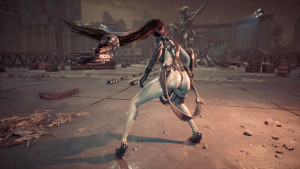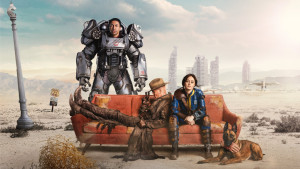Please support Game Informer. Print magazine subscriptions are less than $2 per issue
Big Guns, Big Air, Big Riffs: A Look Back at Neversoft (1994-2014)

Yesterday Neversoft, which had once been Activision's premier in-house development studio, was officially dissolved and absorbed into Call of Duty developer Infinity Ward. In tribute, we look back at the studio's auspicious 20-year history.
Now that the Neversoft story is officially done, we can critique the history and work of a great studio - one that will forever be associated in gamer's minds with its classic franchise, Tony Hawk's Pro Skater. However, the full tale of Neversoft's rise and fall shows that there is much more to the story than just a skateboarding video game.
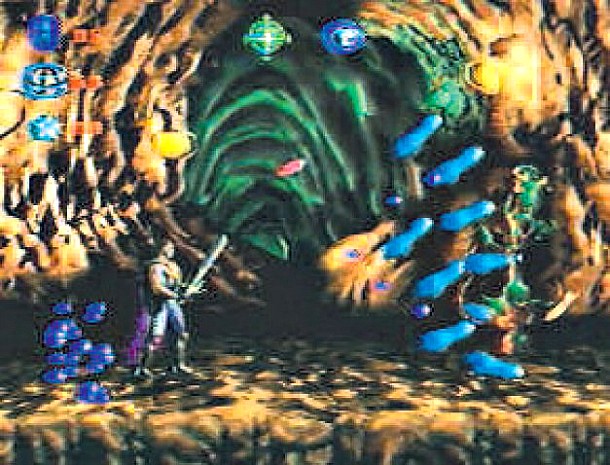
Small Beginnings
Like many of today's triple-A development studios, Neversoft got its start in the wild days of the early 1990s. With new compact disc driven systems like the Saturn and PlayStation making more ambitious game designs possible, many young Americans entered the world of development that had previously been dominated by Japan in the 8- and 16-bit eras.
Neversoft was formed by three such aspiring developers: Joel Jewett, Mick West, and Chris Ward. The studio started out small, working on a game based on a Playmates line of toys called Skeleton Warriors. The Genesis version was cancelled, but it was eventually remade for the Sega Saturn and ported to the Sony PlayStation.
Skeleton Warriors didn't exactly set the gaming world on fire, and the next couple of years were difficult ones for the fledgling studio. Work began on a game based on the Ghost Rider comic book series for Crystal Dynamics, but it was ultimately cancelled before completion. Neversoft kept the lights on by porting Shiny Entertainment's (the company formed by Dave Perry of Gakai/PlayStation Now fame) MDK to PC.
The company's next project was an original game titled Big Guns. Like Ghost Rider, it would never see the light of day. However, it laid the foundation for Neversoft's later success.

Apocalypse Now
While Tony Hawk is the celebrity most associated with Neversoft, the studio's fortunes were actually turned around with a little help from another entertainment icon: action star Bruce Willis.
In 1998, Activision took an interest in the then close-to-death Neversoft. Though it wasn't impressed by Big Guns, it did see something in the game's underlying technology and graphics engine. Activision contracted Neversoft to revive a stalled project entitled Apocalypse, which starred Bruce Willis as the virtual hero and voice actor. Though the finished product was fairly mediocre 3D shooter, Activision was sufficiently impressed with Neversoft's work to give it another shot - this time with a skateboarding game to be powered by the Apocalypse engine (this same engine would also be the basis for Neversoft's excellent Spider-Man game of 2000).
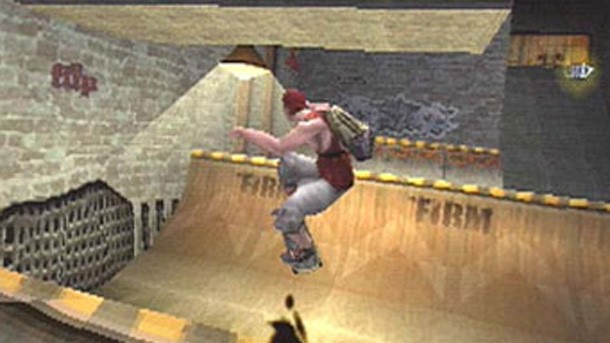
Ramping Up
This Activision skateboarding project eventually became Tony Hawk's Pro Skater, the game that would go on to be an all-time classic of the PlayStation and transform Neversoft into one of the industry's most successful development studios.
I still remember the day that Tony Hawk's Pro Skater arrived in the Game Informer offices. I had just begun working at Game Informer, and a copy arrived for Andy Reiner. We weren't anticipating much from the not-exactly-hot skateboarding genre and a largely unknown developer. We were wrong - in a big way. For more on the day I first saw Tony Hawk, check out this "Moments" feature.
From its very first warehouse level, Tony Hawk became a massive hit - and an addiction for many of us. For a while, the series moved from strength to strength. Tony Hawk's Pro Skater 2 delivered an even better soundtrack and a new manual move for connecting tricks. THPS 3 provided an even more polished experience and added a "revert" - which allowed expert players the near-endless ability to chain trick strings together.
Along with ESPN's X-Games, Tony Hawk's Pro Skater rode a wave of increasing popularity of "alternative" sports. It spawned a host of similarly themed products like Dave Mirra's Pro BMX and Kelly Slater's Pro Surfer at Activision and a new alt-sports game label called O2. While the others weren't developed by Neversoft, each one bore the DNA of the Tony Hawk franchise. For Hawk himself, the games introduced the '80s skating icon to a new generation of fans, making him into a worldwide entertainment brand and advertising spokesman.
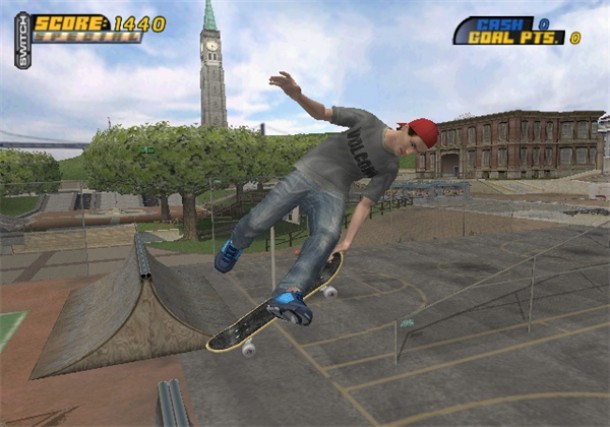
The Crest and the Crash
Tony Hawk's Pro Skater was highly successful, earning both commercial success and critical acclaim. Activision's general policy is to ride a hot property as hard as it can - franchise fatigue be damned. Despite Neversoft's best efforts, the decline of Tony Hawk would come sooner rather than later.
THPS 4 would be the last of the classic games, but even then it was apparent that the formula was beginning to run its course. The next couple of games saw the franchise grasping for a direction. The Tony Hawk Underground games attempted to add off-board action and a cinematic story to the mix. Tony Hawk's American Wasteland offered a large, open-world skating experience. Tony Hawk's Project 8 and Proving Ground tried to add features large and small, but nothing could disguise the fact that the core Tony Hawk gameplay had been exhausted by nine sequels in eight years.
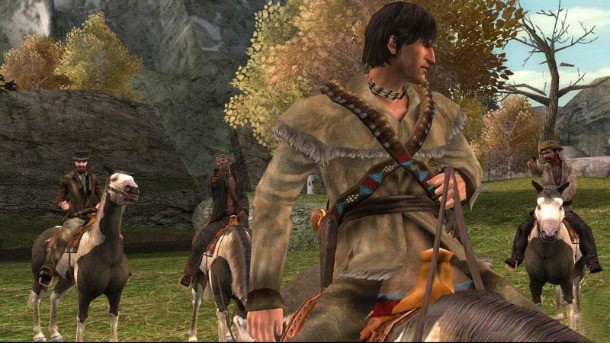
One interesting "might have been" in this period of Neversoft's history is 2005's Gun, released in the same year as American Wasteland. The game aimed to be a gritty, open-world western. Sound familiar? Gun garnered fairly positive reviews, but it didn't sell well. However, it's easy to see that Neversoft was on to something; five years later Rockstar would take the same idea to massive success with Red Dead Redemption - which, it must be noted, is a far better and larger game than Gun. Still, perhaps if Neversoft could have developed Gun into a bona fide original franchise it would still exist today.
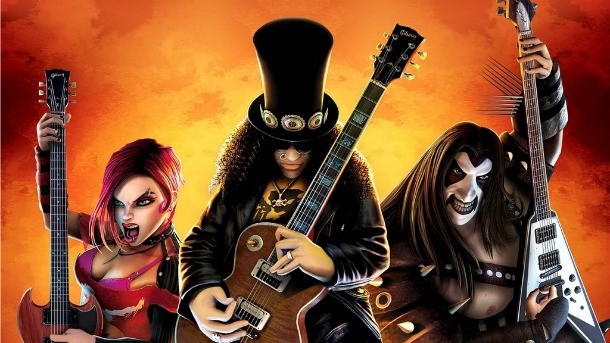
A New Stage
Just as the Tony Hawk series was headed for oblivion, opportunity knocked for Neversoft in the form of another video game phenomenon: Guitar Hero. The original Guitar Hero had been created as a partnership between Red Octane (which had created the controller) and Harmonix (which was largely responsible for the gameplay). After Activision purchased Red Octane in 2006, Viacom and its MTV Games division swooped in and bought Harmonix. Suddenly, one of Activision's biggest franchises needed a developer, which opened the door to Neversoft. Though the game was far different from Tony Hawk, there were some core similarities - both relied on timed-button combos and both were known for excellent soundtracks of licensed music.
Not surprisingly, Neversoft's first entry in the franchise, Guitar Hero III: Legends of Rock, stuck close to the formula laid down by Harmonix. Neversoft, which had already put together some of the best licensed-games soundtracks of all time (including the much-loved THPS 2 soundtrack) did a great job of selecting the music for Guitar Hero III, balancing out a wide variety of tunes from classic rock icons like Alice Cooper and Blue Oyster Cult to more current bands like Queens of the Stone Age and The Strokes. It also added star power with cameos by virtual versions of Rage Against the Machine's Tom Morello and Guns N' Roses star Slash.
Neversoft also injected a bit of its own personality in the gameplay. Though little was changed from previous Guitar Hero titles, Neversoft placed a premium on the challenging gameplay it was known for in Tony Hawk. Some gamers felt like it was too difficult, while dedicated players loved the shredding. Following the completion of career mode, players could tackle Dragonforce's insanely hard "Through the Fire and Flames" during the end credits, a song that became the bar for true Guitar Hero mastery. Guitar Hero III was a huge commercial success, with Activision claiming in a press release that it was the best-selling game of 2007 in both units sold and gross dollars. It eventually went on to exceed $1 billion in sales.

Overkill
Sadly, the huge success of Guitar Hero III, along with with Harmonix's new Rock Band series, sowed the seeds of the music game genre's undoing.
Activision, eager to milk the Guitar Hero franchise for as much money as it could, ramped up production on multiple platforms, including many titles not developed by Neversoft. Meanwhile, Harmonix had its own successful new series, Rock Band, which featured a full band with drums, bass, guitar, and vocals. While Guitar Hero III had won at retail, many critics and fans felt that Rock Band was the superior music game of 2007.
In 2008, Neversoft responded with Guitar Hero: World Tour, a full-band game with a drum kit and a new guitar that featured a unique touchpad high on the neck, which enabled new types of gameplay. It was a good product, but was widely perceived as copycat. Harmonix released Rock Band 2 the same year, which earned high praise from critics and fans and is still seen by many as the high-water mark of the music game phenomenon. That said, Guitar Hero: World Tour still performed admirably.
A deluge of music game products followed World Tour. The next few years were swamped with Guitar Hero-related product, developed both by Neversoft and other Activision studios, including the single-band compilations Guitar Hero: Aerosmith, Guitar Hero: Metallica, and Guitar Hero: Van Halen; the portable games Guitar Hero: On Tour, Guitar Hero On Tour: Decades, and Guitar Hero: Modern Hits, and console entries Band Hero, Guitar Hero 5, and Guitar Hero: Warriors of Rock. Activision also created a new spinoff series, the hip-hop and dance music-focused DJ Hero.
At the same time, Harmonix was also hard at work, pumping out a steady stream of downloadable track for Rock Band in addition to releases like Rock Band 3, Lego Rock Band, Rock Band Unplugged, Green Day: Rock Band, and the much-hyped The Beatles: Rock Band.
The result? Consumers quickly grew tired of these slight variations on the same formula, and the music genre died off as quickly as it had begun. In 2011, Activision officially put Guitar Hero "on hiatus." Harmonix managed to buy itself back from Viacom and MTV Games in 2011 with the help of some investors, and MTV Games shut down later that year.

Welcome to the Machine
With Guitar Hero floundering and the Tony Hawks series not likely to return, Neversoft conducted a round of layoffs, letting go of 50 staffers in 2010. The studio, alongside veteran Activision studio Raven Software, found itself pressed into working on yet another huge Activision franchise: Call of Duty. Based on some job postings, rumors surfaced that the company was trying to create a new shooter IP, but in hindsight it's likely these postings were just a result of staffing up to work on Call of Duty: Ghosts.
Neversoft's involvement with Ghosts was kept quiet for most of the game's development and wasn't publicly revealed until an announcement event for the game, when Infinity Ward said that both Neversoft and Raven had assisted. In the end, Neversoft was credited with creating the game's Extinction mode.
This mode in another studio's game is the last we will see of Neversoft. In a leaked internal memo, Activision Publishing CEO Eric Hirshberg wrote, "As you know, Neversoft and Infinity Ward teamed up for the development of Call of Duty: Ghosts. And through that process, it became clear that the two studios have very complementary skill sets. Between these two excellent studios, it seemed like a single "super-studio" could emerge."
This "super-studio" is retaining the Infinity Ward name, thus ending the 20-year history of Neversoft. Joel Jewett, the last remaining founder of the company and current director Scott Pease, are retiring from the game industry. Having met Jewett, a Wyoming-bred outdoorsman who cruised around L.A. in a giant pickup truck, I'd guess this may be the last we see of him. Hopefully, Pease has a change of heart.
In many ways, it's sad to see such a great studio end not with a bang, but a whimper. But that's the reality of the game industry in 2014. Games are an expensive endeavor, and studios are difficult to run. For all its proud history, Neversoft couldn't beat these long odds, but that doesn't change the memories it left us.









